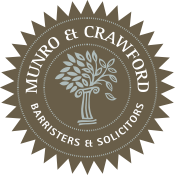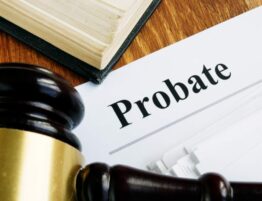When someone creates a Will or a trust, they are considered to have the free will and mental capacity to make their own decisions about what happens after their death.
This means their estate plans should honour their wishes and their wishes alone. If that person is pressured, coerced, or manipulated into changing those plans, this is known as undue influence, and it can cause a whole host of issues surrounding the validity of the Will.
When many people think of undue influence in estate planning, they imagine sinister threats and villainous plots to deceive and steal. And while this certainly fits within the bounds of undue influence, the legal definition of the term is far broader.
So, to help you understand how undue influence in estate planning works, we at Munro & Crawford are going to explore what the term means, how you can recognize it, and the steps you can take to address it.
Contact a Lawyer
What is Undue Influence in Estate Planning?
According to its legal definition, undue influence in estate planning occurs when one individual uses their position of trust or power to manipulate or pressure another into making a decision about their estate that they may not have made otherwise.
In short, undue influence involves influencing the testator to alter a will or trust against their free will. This could take the form of serious threats, blackmail, extortion, or physical violence. It could also be more nuanced, such as emotional manipulation or persistent nagging.
For example, if a person is vulnerable and a loved one uses their position of trust to pressure that individual into naming them as the primary beneficiary in a Will, this could be considered undue influence.
Undue influence undermines the testator’s testamentary capacity, meaning their wishes may not be honored in the way they intended. If an individual believes a Will or trust was the subject of fraudulent influence, this can also lead to lengthy estate disputes during probate.
For this reason, it’s important to know what to look for so you can recognize the signs of undue influence and better protect your interests and those of your loved ones.
Recognizing Signs of Undue Influence in Estate Planning
Identifying undue influence in estate planning is essential to ensure your loved one’s true wishes are honoured. Knowing the signs will also allow you to raise estate disputes and Will contests if required. Here are some of the common red flags to look out for:
- Isolation from family: If the individual creating the Will becomes increasingly withdrawn or isolated from family and friends, this could signify that someone is unduly influencing them. Isolation can be a common tactic to make the individual more susceptible to manipulation.
- Unexpected or sudden Will changes: Significant Will changes, especially those that favor one individual in particular, could signal undue influence. If a friend or caregiver is suddenly named the primary beneficiary over close family, for instance, this could raise concerns of coercion in Wills.
- Dependency on the influencer: As the testator’s health declines, it’s natural that they will begin to rely on one or more individuals for support. However, if someone is entirely dependent on a person and that person is manipulating them, this could be a case of undue influence.
While none of these signs are always the result of undue influence, they can be indicators that warrant further investigation into the validity of the Will.
Proving Undue Influence in Estate Planning
When determining if a Will was unduly influenced, the victim’s estate lawyers will need to prove that the testator was under influence and behaved in a manner inconsistent with typical free will and independent decision-making.
During the legal proceedings, the court will typically examine four variables to reach a decision:
- The testator’s vulnerability.
- The authority the influencer held over the victim.
- The methods and tactics employed by the influencer.
- The resulting unfairness of the Will or trust to the detriment of the claimant.
In most cases, the claimant will lack concrete evidence of undue influence. Therefore, the court will evaluate the above four circumstantial elements to identify patterns and reach a final verdict.
In all cases, the best advice is to work with an experienced probate lawyer who can guide you through the process, act in your best interests, and provide context to the circumstantial evidence you provide.
Legal Consequences of Undue Influence in Estate Planning
If undue influence is proven during an estate dispute, it can lead to significant legal consequences. The precise ramifications of this are usually worked out depending on the nature of the case.
That said, undue influence typically means the court will invalidate either the whole Will or specific provisions within the Will, based on the circumstances.
This means the estate will be distributed according to a previous valid Will if the testator had one. If there is no previous valid Will, the assets will instead go through the probate process and be distributed according to intestacy laws.
In addition, the party which exerted undue influence may need to cover the other party’s court costs and legal fees. They may also be instructed to return all assets they received due to their influence. Lastly, the court could also award damages to the victim if they suffered losses because of the Will contest.
How to Prevent Undue Influence in Your Estate Planning
If you’re currently going through the estate planning process, it’s important to take precautions to ensure your assets are distributed according to your true intentions. Here’s some advice to prevent undue influence as you plan your Will.
- Seek legal advice: Work with an unbiased and experienced estate planning lawyer who can walk you through the estate planning process. An independent attorney will help you get everything in order while ensuring your testamentary capacity is fully recognized.
- Keep detailed documents: Accurate records are crucial, especially when you are making significant changes to your Will that could lead to estate disputes. Work with your lawyer to create detailed documents that support your intentions.
- Have unbiased witnesses present: When you sign your Will, make sure you have witnesses there with you. These witnesses shouldn’t be beneficiaries and should have no stake in your inheritance to ensure they are free from bias.
Need Help Preventing Undue Influence?
Whether you’d like some guidance on planning your estate, need advice on the probate process, or want support as you build a case for undue influence, Munro & Crawford can help.
Our experienced, multi-disciplinary team of Wills and estate planning lawyers will provide all of the critical information, personalized guidance, and legal advice to support you with all aspects of estate administration and dispute resolution.
Contact us today via email, phone, or in person. A member of our friendly team will be on hand to answer any questions you may have.
Get Estate Planning Helpr








